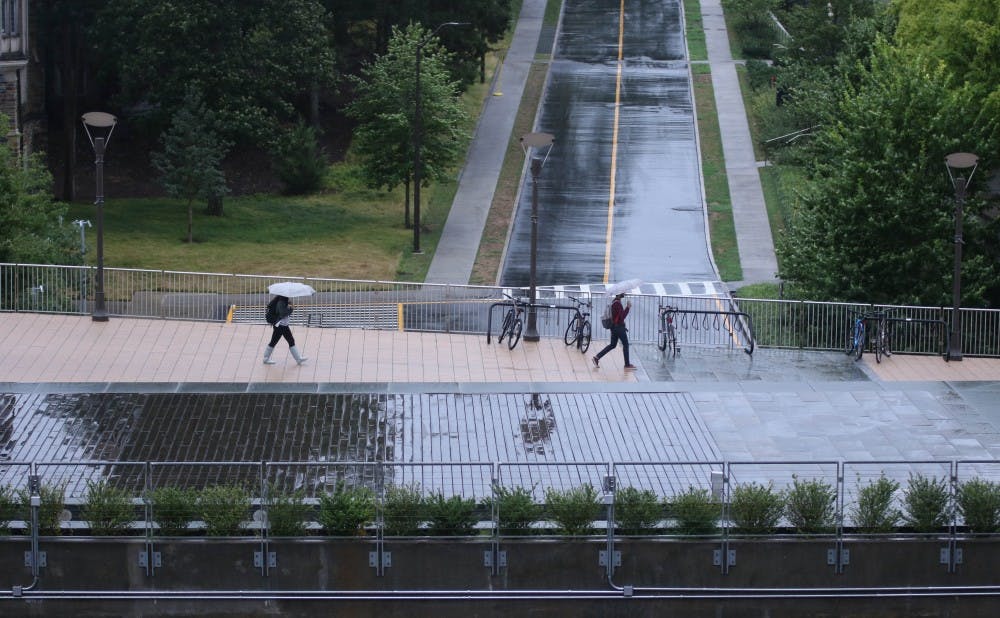Student identity group leaders are frustrated that they are still not being heard after decades of voicing their concerns.
Leaders of student identity groups and Duke Student Government sent an email to administrators on Tuesday expressing frustration towards office space in the Bryan Center being given to the Career Center without sufficient student input.
“Hearing about these plans is concerning to all of us, as few, if any, student leaders were informed of or consulted on these plans,” the email stated. The signatories asked in the email that “the [Career Center] move be rectified with the needs of marginalized student communities in mind,” given that current space is “largely inadequate.”
Mary Pat McMahon, vice president and vice provost of student affairs, responded to the email late Tuesday evening. A copy of her response was obtained by The Chronicle.
She told students that she “[welcomes] a meeting in the near future” and offered a brief explanation for the decision to move the Career Center but wrote that the students’ approach to raising the issue “troubles [her].” She claimed that she shared information about the Career Center move at a Center for Multicultural Affairs Alliance meeting a few weeks ago on Sept. 29.
“I have open office hours and am on a first-name basis with many of you,” McMahon wrote. “I consider you to be valued and prioritized partners and leaders. I hope we can get back on the same page.”
Some students feel as though McMahon’s response was misleading, and others feel threatened and don't feel that it is safe to speak up.
The Sept. 29 CMA meeting
Senior Shania Khoo, president of Asian Students Association, wrote that the discussion at the Sept. 29 meeting was misleading and that the conversation about the Career Center was unclear.
She wrote that students learned at the meeting that “there were plans to move non-student-facing offices out of the Bryan Center to create more space for students in the Bryan Center.” The students were told that the Career Center would be moved into the Bryan Center, “but it was largely grazed over as an example, and it was not clarified that the Career Center would be taking the place of Student Affairs in the upper level.”
Khoo wrote that student groups had previously been promised this particular space by McMahon.
“I am concerned that, once again, marginalized students have been sidelined, ignored and misled by Duke,” she concluded.
‘The tone of these remarks makes us feel threatened’
The other students who spoke to The Chronicle wished to remain anonymous for fear of retribution.
One student felt as though the conclusion of McMahon’s email to them, where she noted she was “troubled” and “[hopes they] can get back on the same page,” was disquieting.
“Beyond brushing over our concerns, the tone of these remarks makes us feel threatened, unsafe and worried that we will face punishment for voicing our needs as marginalized students,” the student wrote.
Administrative priorities
Another student wrote that they “have never felt that administration’s priorities aligned with the needs of its marginalized students,” noting that marginalized students have had to use petitions, open letters and actions to express their concerns to Duke.
“And even then, countless student demands remain unmet, including the demands for adequate multicultural centers that allow for the development of healthy and connected communities of color,” they wrote.
Other students emphasized that marginalized students have been voicing their concerns and needs for decades, with one expressing frustration with administration “attempting to dictate what marginalized students need.”
Get The Chronicle straight to your inbox
Signup for our weekly newsletter. Cancel at any time.
“We need multicultural centers for collective care and coalition building during our time at Duke here and now, not just promises of individual success and career ‘opportunities,’” they wrote.
They added that the response by administration frames the Career Center as an “equity program” and “envelops marginalized student needs for cultural spaces into a neoliberal logic.”
Another student wrote that they are “tired of how long-term change is never within reach due to administrative apathy and bureaucratic barriers.” They wrote that student center spaces “are not used effectively,” adding that cultural spaces are “small, inaccessible and relegated to the bottom floor.”
The students continue to reiterate their demands because “we need to be heard and taken seriously,” the student wrote.
McMahon’s response
McMahon said that she has reached out to the students who sent the DSG resolution and initial email and that they’re setting a date to further discuss things. She also noted that Duke administration has “an extensive set of updates due to the student community” and they they’ll be sent out more broadly shortly.
“I look forward to being in partnership with students from here,” she wrote.
Nadia Bey contributed reporting.

Leah Boyd is a Pratt senior and a social chair of The Chronicle's 118th volume. She was previously editor-in-chief for Volume 117.

